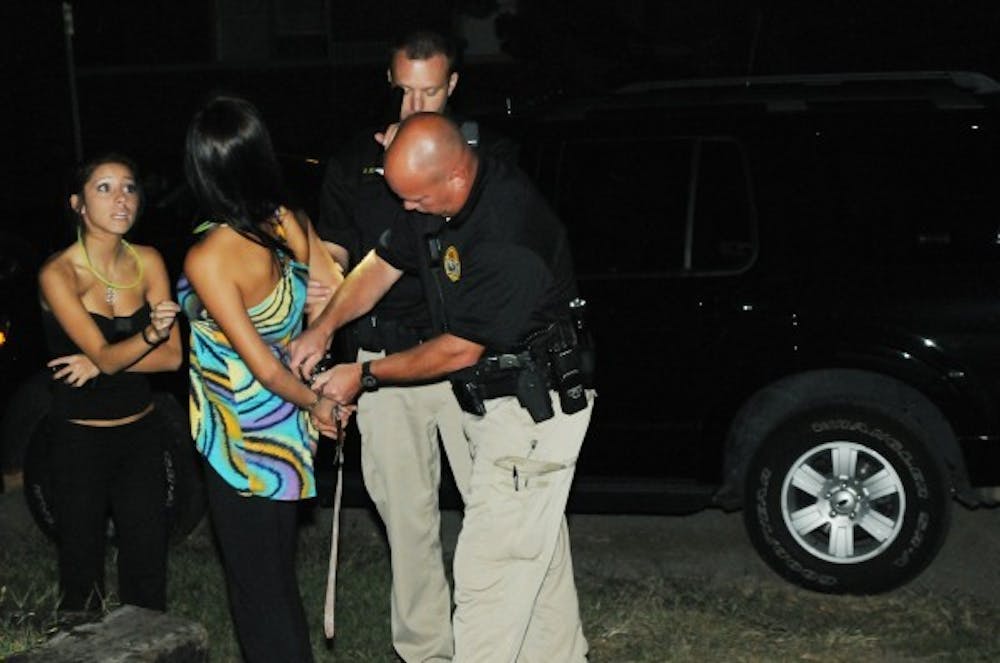Click here for an audio slideshow about Excise Police around BSU
Cpl. Brian Lang has been doing his job for 19 years. Even after all that time, he insists that no day on the job is ever the same, especially during the first week of school at Ball State.
It's just the start of another busy season for Lang. As a member of the Indiana State Excise Police, he and other officers spent the weekend cracking down on alcohol-related violations.
On a regular night for excise police, they begin at the local bars, stopping at places such as Dill Street Bar and The Locker Room. Police officers search for improper identification, underage drinkers and people who are overly intoxicated.
"Where it is dangerous at the bars is when there is 300 or 400 people in a crowd," Lang says. "We've had an officer, who's retired now, who got hit with a beer bottle and lost his eye. There can be dangers to doing this."
Checking the bars to ensure they are operating smoothly is an important factor in making sure students are safe. After all the bars are checked, the police move to the streets.
While Lang drives around campus and the surrounding neighborhoods, students fill the streets, sidewalks and front porches.
Lang says that when it comes to patrolling the streets, excise officers look for people carrying alcohol or physical signs of intoxication, such as people passed out and vomiting.
"While it helps having an unmarked car, still most of the people we deal with, the violations are blatant," he says.
As he drives around the edge of campus, observant students yell, "There's excise!"
Though they drive unmarked cars, Lang says in concentrated areas like a university, the excise police doesn't try to stop everyone.
"If someone is helping someone, friends and things, we might stop to make sure everything is under control, but it's not just about taking people to jail," he says. "When it comes down to it, we're all working together. We want the same end result and goal, and that is to reduce alcohol-related crimes."
Lang says being part of excise is challenging because they deal with people who think drinking is a rite of passage.
"People say, ‘Hey, it's college!' and ‘That is the experience!' or ‘Hey, I can go fight for my country, but I can't drink alcohol,'" he says. "We've learned not to let that upset us because we look at the negative consequences like alcohol poisoning or a wreck."
A student is given a citation for minor possession and consumption of alcohol. Lang discusses the procedure with the student to make sure she understands the violation, files the citation and secures that the student had a ride home with a police officer. Other incidents are not as easy.
Lang acknowledges that what may seem like a routine stop could escalate into something more.
Around 1 a.m., Lang experiences such an incident. After approaching a Ball State student who threw a beer can onto the sidewalk, Lang gives a citation for minor possession and consumption of alcohol, but conflict arises when the student refuses to sign the citation.
Lang says that the way a situation will turn out is always dependent on the level of respect the perpetrator gives the officer.
"You stop and think about it. I treat everyone with respect until they don't treat me with respect," he says. "It's the golden rule: Treat people like you want to be treated."
No matter what his work day is like or what new experience he has, Lang says it's a job with a lot of satisfaction.
"I love my job," he says. "I think the most satisfaction is not picking on the kids, so to speak. I think I can help one person and prevent one bad thing from happening, such as a person being in a vulnerable situation or something as simple as helping the neighbors out.
"The first day of the job, you know if you're going to make it or not. I think the majority of police officers become a police officer because they want to help people. You're either cut out for it or not."




